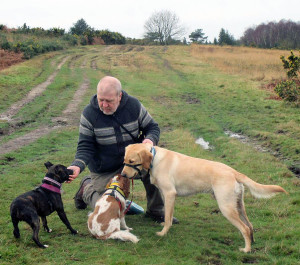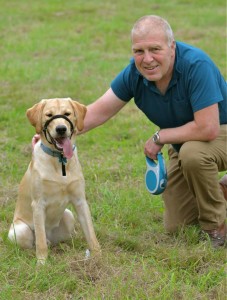Today, I’m pleased to welcome Richard Clark, an award-winning journalist who enjoys traveling around Greece, then publishing books to share his experiences. Anything that promotes my country is a great thing in my book, so I was thrilled when Richard accepted to do this interview. Richard’s writing is peppered with intriguing historical facts and vivid descriptions. I have read his book on Corfu and learned a lot about the island that I didn’t know. Stick around to hear more from the man himself!
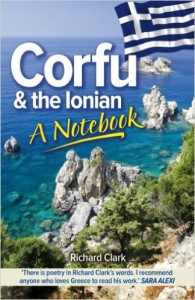 The Ionian Islands stand at the gateway to Greece, with Corfu its gatekeeper. For so much of its history Corfu stood as protector of the Adriatic and its Venetian rulers, but now the island has turned its gaze south towards its Greek homeland. On reaching Corfu, something happens to the light, as if some celestial switch has been flipped, changing everything…
The Ionian Islands stand at the gateway to Greece, with Corfu its gatekeeper. For so much of its history Corfu stood as protector of the Adriatic and its Venetian rulers, but now the island has turned its gaze south towards its Greek homeland. On reaching Corfu, something happens to the light, as if some celestial switch has been flipped, changing everything…
Corfu – A Notebook is a series of snapshots of places, the people and culture of those who inhabit this beguiling island and some of its neighbours in the Ionian group. More of a travelling companion than a guide, this is the fourth of Richard Clark’s books about the Greek Islands.
VISIT AMAZON NOW
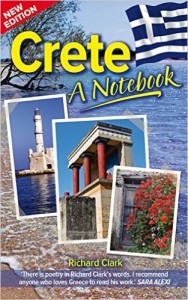 In 1982, on a whim, the English journalist Richard Clark upped sticks and left the country of his birth to go and work as a teacher in Crete. So began a love affair with the island to which he still returns as often as possible.
In 1982, on a whim, the English journalist Richard Clark upped sticks and left the country of his birth to go and work as a teacher in Crete. So began a love affair with the island to which he still returns as often as possible.
Crete – A Notebook is a series of snapshots of his experiences on an island he has grown to cherish. It is less of a travel guide and more of a travelling companion.
Whether a regular visitor or a first-time traveller there, this book provides an invaluable insight into life past and present on this exquisite island.
VISIT AMAZON NOW
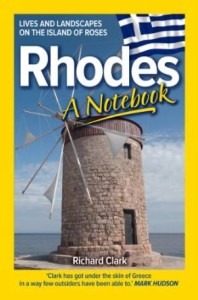 Little more than a stone’s throw from the Turkish coast, Rhodes was the final piece in the jigsaw of what is modern Greece. The island has changed its clothes so many times throughout history that it can be difficult to pin down what best reflects its character, and herein lies the Island’s charm. The variety of its architecture and the wealth of myth and legend combined with an ever-changing landscape makes for a destination which can hold the interest for a lifetime.
Little more than a stone’s throw from the Turkish coast, Rhodes was the final piece in the jigsaw of what is modern Greece. The island has changed its clothes so many times throughout history that it can be difficult to pin down what best reflects its character, and herein lies the Island’s charm. The variety of its architecture and the wealth of myth and legend combined with an ever-changing landscape makes for a destination which can hold the interest for a lifetime.
For many it is the Crusader Knights who prevail, for others the lost wonder of the fallen Colossus or the Doric columns of the temple celebrating the Ancient Greek cult of Athena Lindia which presides over the maritime gem of Lindos. Whatever memories it leaves us with, it is an island full of surprises.
VISIT AMAZON NOW
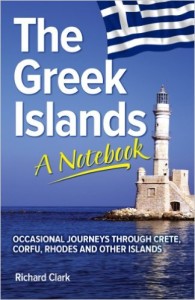 In 1982, on a whim, the English journalist Richard Clark upped sticks and left the country of his birth to go and work as a teacher in Crete. So began a love affair with the Greek Islands, to which he now returns on a regular basis.
In 1982, on a whim, the English journalist Richard Clark upped sticks and left the country of his birth to go and work as a teacher in Crete. So began a love affair with the Greek Islands, to which he now returns on a regular basis.
The Greek Islands – A Notebook is a series of snapshots of Journeys and Places, Culture and History, and People and Island Life on Greece’s enchanted triangle of islands – Corfu, Crete and Rhodes and the islands in between.
Whether a regular visitor or a first time traveler there, this book provides an invaluable insight into life past and present on these beautiful islands.
VISIT AMAZON NOW
Hello Richard and welcome to my blog!
Hello, Fros. Thank you for the invitation.
I love the sound of all your travel notebooks! Tell us more. How did they come to be?
My first published work was The Greek Islands – A Notebook, which really came about as the fulfillment of a lifelong ambition just to actually write a book. In fact, it was not my first attempt; I had written a children’s book (which has since been published in paperback) whilst living in Crete in the early eighties as a gift for my newly born niece at the time. Journalism kept me going over the years with newspaper and magazine articles being published on a regular basis so when I eventually found the time and discipline to embark on working on a book I did not come to it cold. I wrote about the Greek Islands following the much given advice about writing about something you know and you are passionate about. I was a teacher in Heraklion in Crete in the early 1980s and, since returning to England and journalism, had travelled extensively in Crete and other Greek Islands. I still regularly visit Greece three times a year.
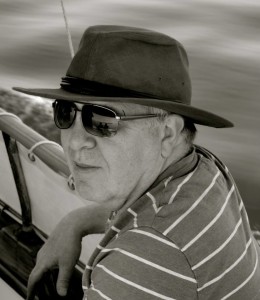
Richard enjoys sailing in Greece
What was the first thing you ever wrote and how old were you then?
This probably sounds precocious, but the first thing I remember writing was for a literary competition at the age of 5. I have always enjoyed the creative process and was brought up by a father who was a successful crime writer, so I suppose it’s in the genes. Anyway, this competition was run by the local public library service and was open to children under the age of 16 and my primary school got all its pupils to enter as part of their day-to-day lessons. Low and behold, I won and was awarded with a fistful of book tokens, which came in very handy as even at that age, I was an avid reader.
What other writing have you done? Anything else published?
To date I have seven books published, and a Greek translation of my most successful book, Crete – A Notebook, is in the pipeline. In terms of journalism I have written across a wide range of subjects from politics to travel, sport to cookery and celebrity interviews for a wide range of national newspapers and magazines in the UK.
Any hobbies or interests that you enjoy in your spare time?
I love to read; it is one of the greatest pleasures in life. While commuting from my home to central London daily, I have plenty of time to indulge my passion. Other than that I enjoy music and try to play the guitar, although my son, who is a professional musician, will confirm quite how dreadful I am. I love to cook and do so on a daily basis. I also enjoy sailing, watching rugby and walking with my dogs.
Oh, they’re so cute! Thank you for sharing these photos; doggies are particularly welcome in this blog! What are you working on at the moment? Tell us a little about your current project(s).
I have been in hiatus over the last six months or so, but having just returned from a break travelling to some of the less well-known parts of Crete, I have started writing another book about the island with a working title of ‘Hidden Crete’ which I hope will encourage people to get off the usual tourist trail and discover other parts of this extraordinary and beautiful place. I have also got a couple of other ideas bubbling under, but they are not fully enough formed to talk about yet.
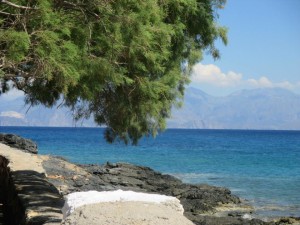
A picture from Elounda, Crete
Which are your favorite authors, and what do you love about them?
We are walking on shifting sands here as my favorite authors keep changing, and the list is always being added to, although there are some constants that remain the bedrock of my reading list. Unsurprisingly, I do read a lot of writers with Greek connections and of course I love Kazantzakis. Weirdly, I first started reading ‘Zorba the Greek’ whilst waiting to board a ferry to Crete from Piraeus on my very first visit to Greece. Coincidence or not, I have loved his work ever since but, if I had to choose one of his books, it would be ‘Report to Greco’. Of course I like Patrick Leigh Fermor and I also like Lawrence Durrell’s Greek travel writing. His ‘Alexandria Quartet’ is also a favorite of mine, although I find some of his later novels a bit impenetrable. There is a beautiful little book Durrell wrote which I think is now out of print, and I gave my copy away to a friend. It is called ‘A Smile in the Mind’s Eye’. I keep waiting for it to be reissued. Of the contemporary authors writing about Greece, of course I like Victoria Hislop, Sara Alexi is also making a well-deserved reputation for herself and in terms of non-fiction, I like the work of Marjory McGinn.
I also love Kazantzakis and Victoria Hislop and have enjoyed Gerald Durrell’s My Family and Other Animals since it’s set on Corfu. I’ve also enjoyed the travel memoirs of Marjory Mc Ginn and recommend them highly. What genres do you read mostly, and what are you reading now?
Over the last few years I have started to enjoy crime fiction, something I had steered clear of before. It started when a friend recommended the Stieg Larsson Books and from there I moved on to Henning Mankell and Andrea Camilleri. I have just worked my way through C.J. Sanson’s Shardlake mysteries. For crime with a Greek theme I really like both Anne Zouroudi and Jeffrey Siger’s books.
I don’t read much crime fiction but I’ve read Anne Zouroudi and she’s wonderful. Tell us, what do you enjoy the most as an indie author that you imagine you wouldn’t if you were traditionally published? If you had a choice would you still go indie?
When I started writing the first Greek book I really hadn’t thought about the publishing process; I just wanted to see if I could sustain the discipline to write a book. Being a journalist, I am used to seeing my work in print on a regular basis so that side of it didn’t excite me perhaps as much as it should have. When I neared the end of that book I began to think about the publication and was reading a lot online about indie publishing and it seemed to me the obvious way to go. I am in the fortunate position of having access to designers and editors who I know through work so the preparation of the manuscript and the cover was not a problem. I also employ an excellent formatter to prepare the eBook editions and design the interior of the paperbacks. For the most part I love the process, I am in total control and the timescales are much more acceptable than those operated by traditional publishers. The royalties are also far superior and I can put out however many books I want on my own schedule. The difficult part is the marketing. I am not a natural extrovert, so find selling my work hard, but the fact is that most ‘legacy publishers’ do little or no marketing for most of their writers nowadays. For me the stigma of whether I am taken seriously as an indie writer is borne out by the level of sales I have achieved, much more than many traditionally published authors. Ironically, for me to go down that route would be ‘vanity publishing’, as I would only be doing it to bestow on myself any kudos that might bring.
Oh yes, the marketing is always the difficult part for all indie authors… What are the things in your life that you’re most grateful for?
That’s an easy question to answer. My wife, Denise, and children Rebecca and James. Every day I feel blessed to have them.
Oh, that’s sweet… and good for you, Richard. Who is your favorite poet? Quote a couple of lines from your favorite poem.
Difficult, but I think T.S. Eliot just shades it, although, if I am allowed to include Bob Dylan as a poet…
Be my guest! I can think of a multitude of songwriters that I personally regard as poets!
Well, there’s a line in Dylan’s song ‘Mr Tambourine Man’ which I cannot hear without thinking about the famous beach sirtaki dancing scene from ‘Zorba the Greek’. This personal connection I have made evokes such wonderful images whenever I hear these words…
‘Yes, to dance beneath the diamond sky with one hand waving free
Silhouetted by the sea, circled by the circus sands
With all memory and fate driven deep beneath the waves
Let me forget about today until tomorrow’
That’s beautiful. Thank you for sharing it with us, Richard, and for being here with us today! Happy travels!
Thank you Fros, it’s been a pleasure.

Richard Clark is the author of six books about Greece, his first The Greek Islands – A Notebook was published in 2011 followed by books about Crete, Rhodes and Corfu. A new edition of his best-selling Crete – A Notebook was released in the summer of 2014 and a Greek translation of this book is in the final stages of publication. Each of his individual ‘Notebooks’ has achieved No1 status in their individual listings on Amazon both in the UK and USA. Richard holds a BA degree in English Literature, is an award-winning journalist and is the son of the late author Douglas Clark.
In 1982, on a whim, the English journalist Richard Clark upped sticks and left the country of his birth to go and work as a teacher in Crete. So began a love affair with the Greek Islands which he frequently returns to.
His books are a series of snapshots of his experiences on the islands he has grown to love. They are less travel guides and more travelling companions.
The author is a writer, editor and journalist who has worked on an array of national newspapers and magazines in the UK. Currently he is Group Deputy Editor of the mass-market consumer magazines TV Times and TV&Satellite Week. He is married with two grown up children and lives in Kent in South East England.
The books are available in both paperback and as eBook editions from Amazon and other major retailers.
Visit Richard’s Amazon page
Visit Richard’s Facebook page
 Have you enjoyed this post? Follow the blog (see right sidebar) and miss no more posts! You can also sign up to Effrosyni’s newsletter to keep up to date with her news (very sparse emails). Interested to read more? Head over to Effrosyni’s Blog, where you’ll find her earlier interviews, book reviews, author tips, travel articles and even Greek recipes!
Have you enjoyed this post? Follow the blog (see right sidebar) and miss no more posts! You can also sign up to Effrosyni’s newsletter to keep up to date with her news (very sparse emails). Interested to read more? Head over to Effrosyni’s Blog, where you’ll find her earlier interviews, book reviews, author tips, travel articles and even Greek recipes!
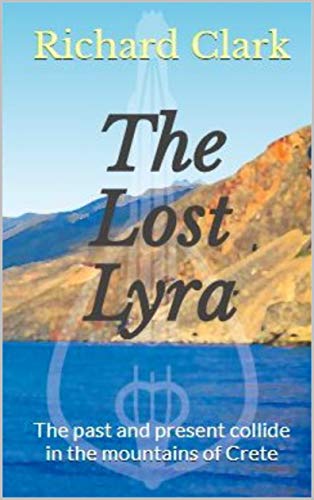
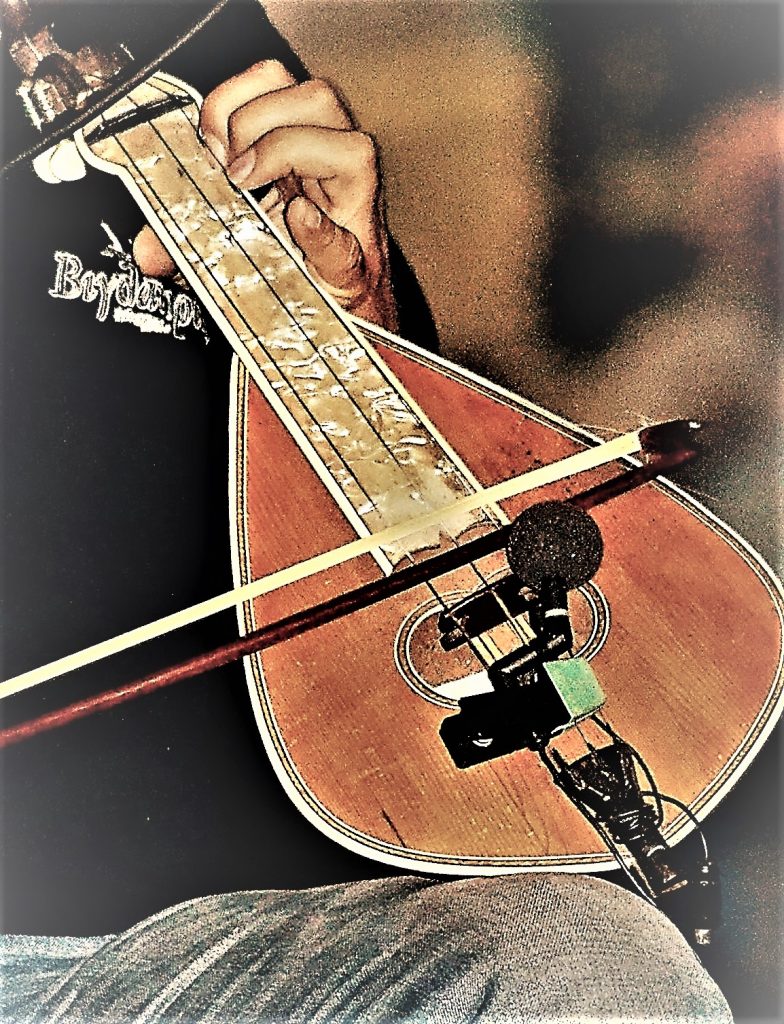
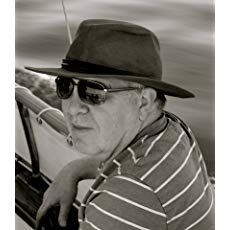


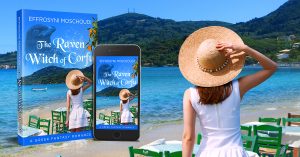 NEW RELEASE BESTSELLER! 370 pages of Corfu summer bliss! This beach romance will make you fall in love… Choose between the paperback or 4 kindle episodes!
NEW RELEASE BESTSELLER! 370 pages of Corfu summer bliss! This beach romance will make you fall in love… Choose between the paperback or 4 kindle episodes! Did you enjoy this post? GO HERE to follow this blog and get to see all our future posts!
Did you enjoy this post? GO HERE to follow this blog and get to see all our future posts! 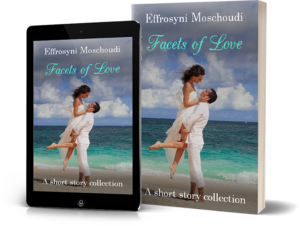 To grab “Facets of Love” for FREE, go here! Planning to visit Greece? Check out our FREE guide to Corfu! For delicious Greek recipes, go here. Are you an author? Check out our FREE promo tips & resources here.
To grab “Facets of Love” for FREE, go here! Planning to visit Greece? Check out our FREE guide to Corfu! For delicious Greek recipes, go here. Are you an author? Check out our FREE promo tips & resources here.





